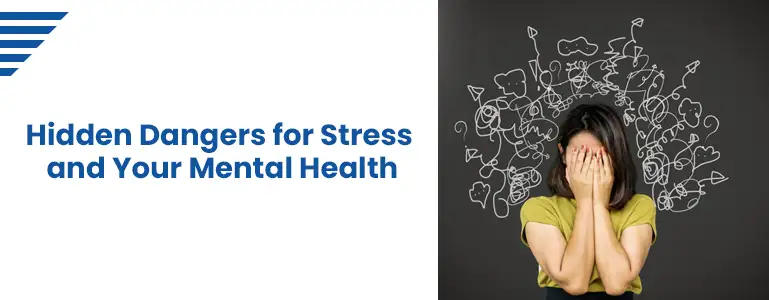Hidden Dangers for Stress and Your Mental Health

In today's fast-paced world, stress has become an almost constant companion for many of us. It's not just the typical sources of stress like work deadlines or relationship issues that we need to worry about. There are hidden dangers lurking in our daily lives that can take a toll on our mental health. In this blog, we will explore some of these hidden dangers and discuss how they can affect your well-being.
Social Media and Comparison
While social media platforms offer a great way to stay connected with friends and family, they also come with a hidden danger – the constant urge to compare our lives with others. Scrolling through carefully curated feeds filled with seemingly perfect vacations, relationships, and achievements can lead to feelings of inadequacy and low self-esteem. This constant comparison can fuel stress and anxiety, as we strive to measure up to an unrealistic standard.
To mitigate this danger, it's essential to remember that what people choose to share on social media is often a highlight reel of their lives. Limit your screen time and prioritize real-life connections to foster a healthier perspective.
Home Sample Collection
Perfectionism
The pursuit of perfection can be a hidden stressor that takes a toll on your mental health. Constantly striving for flawlessness in every aspect of life can lead to chronic stress, anxiety, and even depression. Perfectionists tend to set impossibly high standards for themselves, which can be mentally and emotionally exhausting.
To combat perfectionism, it's crucial to embrace the idea that making mistakes and imperfections are part of being human. Set realistic goals and learn to accept that not everything needs to be perfect.
Multitasking
In today's fast-paced world, multitasking is often seen as a valuable skill. However, constantly juggling multiple tasks can lead to increased stress levels and decreased productivity. Your brain becomes overloaded, leading to feelings of overwhelm and frustration.
Instead of multitasking, try practicing mindfulness and focus on one task at a time. This can help reduce stress and improve the quality of your work.
Lack of Sleep
In our busy lives, sleep is often sacrificed in favor of work, socializing, or other activities. However, inadequate sleep can have serious consequences for your mental health. Sleep deprivation can lead to increased stress, irritability, and impaired cognitive function.
To prioritize your mental health, make sure to get enough sleep each night. Aim for 7-9 hours of quality sleep to ensure your mind and body can recover and recharge.
Neglecting Self-Care
Many people neglect self-care in their daily routines, thinking they don't have the time for it. However, self-care is essential for maintaining good mental health. Neglecting self-care can lead to burnout, increased stress, and decreased resilience to life's challenges.
Incorporate self-care practices into your daily life, even if it's just for a few minutes. This can include activities like meditation, exercise, journaling, or simply taking a break to relax and recharge.
Conclusion
While stress is a common part of life, it's essential to be aware of the hidden dangers that can exacerbate its effects on your mental health. Social media comparison, perfectionism, multitasking, lack of sleep, and neglecting self-care are all factors that can contribute to increased stress and negatively impact your well-being.
By recognizing these hidden dangers and taking steps to mitigate their effects, you can better protect your mental health. Prioritize self-care, set realistic goals, and make conscious choices to limit stressors in your life. Your mental health is worth the effort, and taking proactive steps to reduce hidden stressors can lead to a happier and more balanced life.
Frequently Asked Questions
What are hidden dangers for stress and mental health?
Hidden dangers for stress and mental health are sources of stress that may not be immediately obvious but can significantly affect your well-being. These include factors like social media comparison, perfectionism, multitasking, lack of sleep, and neglecting self-care.
How does social media comparison affect mental health?
Social media comparison can lead to feelings of inadequacy and low self-esteem when you constantly compare your life to the seemingly perfect lives of others. This can contribute to stress and anxiety.
Why is perfectionism harmful to mental health?
Perfectionism involves setting impossibly high standards for oneself, which can lead to chronic stress, anxiety, and even depression. It can also hinder one's ability to accept mistakes and imperfections.
What's the impact of multitasking on mental health?
Multitasking can increase stress levels, lead to feelings of overwhelm, and decrease overall productivity. It can put a strain on your mental resources and hinder your ability to focus effectively.
How does lack of sleep affect mental health?
Inadequate sleep can lead to increased stress, irritability, and impaired cognitive function. It can also contribute to mood disorders and decrease your ability to cope with stressors.
Why is self-care important for mental health?
Self-care is essential for maintaining good mental health because it helps reduce stress, prevent burnout, and improve overall well-being. Engaging in self-care activities can promote relaxation and emotional resilience.
What are some self-care practices to combat hidden stressors?
Self-care practices include meditation, exercise, journaling, spending time in nature, taking breaks, setting boundaries, and engaging in hobbies and activities that bring you joy.
How can I manage the hidden dangers of stress in my daily life?
To manage hidden stressors, it's important to recognize their presence and take proactive steps to address them. This may involve limiting social media use, setting realistic goals, practicing mindfulness, prioritizing sleep, and making self-care a part of your routine.
When should I seek professional help for stress and mental health issues?
If you find that stress is significantly impacting your daily life, relationships, or ability to function, or if you experience symptoms of anxiety or depression that persist, it's essential to seek help from a mental health professional. They can provide guidance, therapy, or other forms of support to address your specific needs.
Can addressing hidden stressors improve overall mental health?
Yes, addressing hidden stressors can lead to improved mental health. By identifying and mitigating these sources of stress, you can reduce their negative impact on your well-being, enhance your ability to cope with challenges, and experience greater emotional resilience and balance.
Book Your Slot
Our Locations Near You in Hyderabad
3KM from Banjara Hills
1.9KM from Yusufguda
3KM from Madhura Nagar
5KM from Shaikpet
Profiles
- Cardiac Risk Profile
- Pituitary marker Profile
- Rheumatoid Arthritis Profile
- Dengue Fever Panel
- Lung Cancer Panel 1 Complete Molecular
- Gastroenteritis Screening Panel
- Thyroid Profile (T3,T4,TSH), Serum
- Pancreatic Marker Profile
- STD profile
- Androgen Profile
- Lipid Profile, Serum
- Pancreatic(acute)Profile
- PCOD Profile
Radiology
Pathology Tests
- Glucose Fasting (FBS),Sodium Fluoride Plasma
- Creatinine, Serum
- Glycosylated Hemoglobin (HbA1C)
- Vitamin B12 (Cyanocobalamin), Serum
- Thyroid Stimulating Hormone (TSH) Ultrasensitive, Serum
- Complete Urine Examination (CUE), Urine
- Liver Function Test (LFT),Serum
- Dengue (IgG & IgM), Serum
- Dengue Antigen (Ns1) Rapid, Serum
- C-Reactive Protein (CRP), Serum
- Widal (Slide Method), Serum
- Total IgE, Serum




